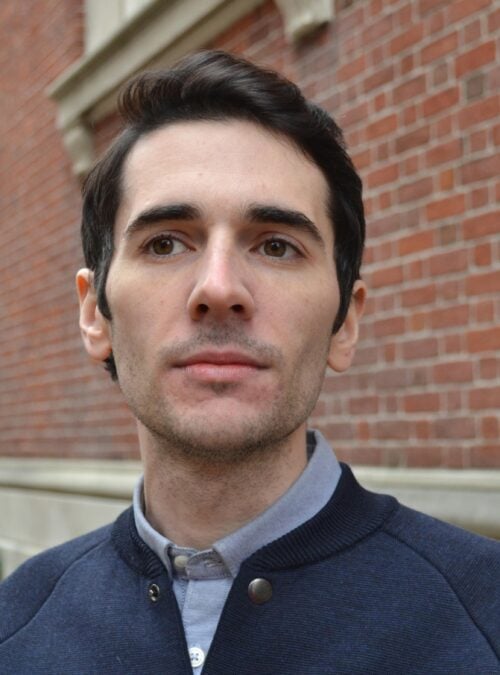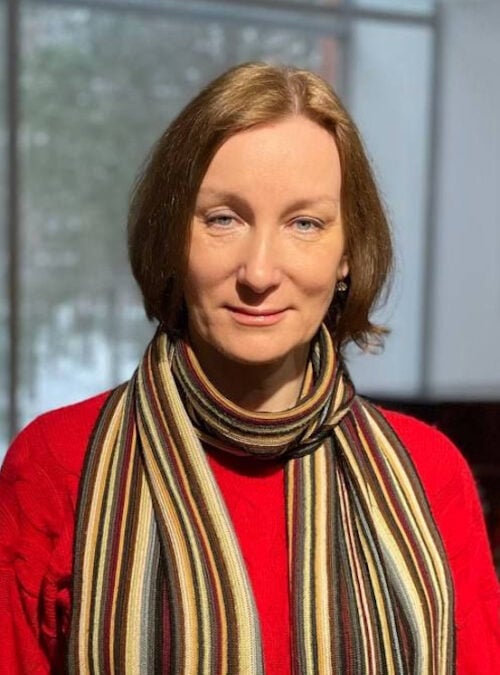Interview with Francis Catalano, poet and translator from Italian into French
Author: Gianni Pillonca, former director of the Italian Cultural Institute of Montreal

Valerio Magrelli‘s translator in Quebec is a French-speaking Canadian poet, Francis Catalano. Catalano edited the translation of two collections: Le vase brisé and Instructions pour la lecture d’un journal, for which he was awarded the 2006 Prix John Glassco from the ATTLC (Association des traducteurs et traductrices littéraires du Canada). Catalano has published eight collections of poetry, from his first, Romamor in 1999, to Climax (2022, Prix d’excellence poésie La Métropole, 2023). Some of his poems have appeared in English, Spanish and Italian translations. In 2020, he published a collection of short stories, Qu’il fasse ce temps, and in 2021, L’origine du futur. He has also edited anthologies of Italian poetry and translated poems by Luzi, Sanguineti, Zanzotto and Porta. He is currently working on the translation of Magrelli’s Exfanzia.
What is the relationship between your poetry and the verses you translate? Are they two watertight compartments or is there interaction?
I always have in mind Novalis’ warning that one has to be a poet to translate poetry. There is a symbiosis between the two activities. Translation is also a creation. There is a creative aspect to translation. When you write poetry you translate something that is in a language that you do not know, or that you do not yet know. In translation, you start with a language that you know and you deal with something that is already organised.
What kind of collaboration is there between you and the poet you are translating, in this case Magrelli?
I am fortunate to work with a poet who is also a translator and therefore knows very well the difficulties and problems that a translator encounters. He really likes to read the versions of his poems, and have a look to see if there are any mistakes. He is very sensitive to the rendering of rhyme and rhythm. And that’s fine with me, because I too am very sensitive to the sonority of verse.
Magrelli is also a poet who knows the French language very well, being a professor of French literature… A great challenge for the translator but also a unique opportunity.
I must also add that it is a double task because it is a translation done in collaboration with Antonella D’Agostino, also a translator. And this also offers another pleasant opportunity for discussion and deepening.
How do you two work?
We divide the book into equal parts and then each one reviews the other’s version. And the unity and harmony between us in the rendering of the verses is incredible. It was not like that in the beginning, when I translated the whole book and she checked the versions. It was a revision. Now we have come to this new collaboration that is very fruitful and satisfying for both of us.
In your poetry, origins are important. Your latest prose book is entitled L’origine du futur. Tell me something about your origins, Italian on your father’s side and Quebecois on your mother’s side.
They have a centrality in my work. In French there are two almost similar terms – originel and original – with two important meanings for creative work. I speak of origins in an original way. My first collection, Romamor, was a reflection on origins, on paternal origins but also on Rome as the centre of western civilisation. The same with Index, which is also about origins, but of North American origins. Where the title, Index, refers to the India that the discoverer thought he had reached and the final letter, x, refers to the errors and the deletion of the word Inde [in French: India]. And speaking of origins, the collection also deals with the first inhabitants who came from Asia by crossing Siberia and the Bering Strait. An early example of immigration. This is also the case for my latest book, an investigation of ancestors from the most familiar, but also universal point of view. Where I come from, where one comes from.
It reminds me of Eliot’s historical consciousness. Something that distinguishes both your prose and your poetry.
And also Rilke, who said ‘For the sake of a single verse one must see many cities, men and things’. Places are also important in my poetry. The link between places and memory. As the ancients well knew, they cultivated the art of memory anchored in the order of places.
Which Italian poets do you favour and which may have had an influence if not on your poetry then at least on your training as a poet?
I would say, Zanzotto. For the sense of freedom that inspires his poetry, especially from a linguistic point of view. His multilingualism that incorporates dialect with equal dignity. And its complexity. Another poet I like is Antonio Porta. I find in him the same sense of freedom. And come to think of it, for the few books I have read, Caproni too. And of course, Pasolini, both prose and poetry.
When did you learn Italian. Was it spoken in the family?
No, at home we only spoke French. My father, from San Leucio del Sannio, arrived in Québec already fluent in French having lived in France for a few years before moving to Montréal. I learned Italian on my own. My first contact with the Italian community was with Fulvio Caccia and Antonio D’Alfonso of Guernica Editions, who asked me to collaborate on an anthology of Italian-Canadian poets. I was only in my early twenties. It was then that I realised my Italian origins, which I had not paid attention to until then! Then I came to Italy with a scholarship to pursue my maîtrise [master’s thesis] on Francesco Giuseppe Bressani, a 17th century Jesuit who lived and wrote about Quebec. A fascinating story of kidnapping, torture. Bressani wrote a letter to his superior on birch bark with an ink made from gunpowder.
How did you come across Magrelli?
At a conference on translation, while I was in Rome. It was the first time I met Magrelli and from there my interest in his poetry was born. I must also admit that reading and translating Magrelli encouraged me to take up writing again, to write verse, an activity I had put aside a bit. It gave me the impulse to write again. In my first collection, some might hear a ‘Magrellian’ note. In the words of Bonnefoy, one could speak of ‘traduction au sens large’. I meet Magrelli as a translator. I feel like reading him and then translating him. But not only that: I get an incentive to write poetry myself and to continue translating him!
What is the level of editorial interest in Italian literature in Québec?
As far as poetry is concerned, given the financial difficulties and scarce support, it is essential that the publisher has a specific and personal interest in poetry. Generally, we are dealing with poets. This was the case with Paul Bélanger of Éditions du Noroît, with Magrelli. The same for Antonio Porta, again with Bélanger. And now with Exfanzia, with Stéphane Despatie and Corinne Chevarier, who are the new editors, also poets










